M.D./Ph.D. program trains physician-scientists of tomorrow
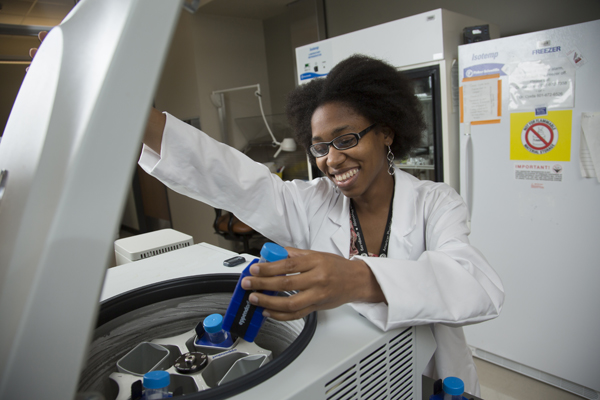
Published in News Stories on October 31, 2016
(This article first appeared in the Fall 2016 issue of Graduate Report, the annual publication for the School of Graduate Studies in the Health Sciences.)
UMMC is training Mississippi's next generation of physician-scientists through its M.D./Ph.D. program.
Physician-scientists have professional degrees, clinical training and conduct independent research. Achieving one of these is difficult; three is another matter. UMMC's M.D./Ph.D. program is thriving, said director Dr. Sean Didion.
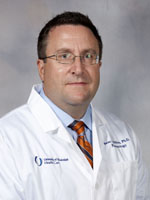
Didion
“The program experienced a reinvigoration in 2012 and 2015 was a benchmark year,” said Didion, associate professo of pharmacology and toxicology. “Between those years, we doubled enrollment and now have all seven class years represented.”
Started in 2002, UMMC's program graduated eight students by 2011, followed by four years without a graduate. In 2014, the National Institutes of Health reported similar stagnation in physician-scientist education nationwide and attributed it to limited grants and mentors.
UMMC supports its M.D./Ph.D. students with the A. Wallace Conerly Scholarship, which provides tuition and stipend support. In recent years, the number of available scholarships has grown from eight to 14, increasing enrollment
opportunities.
“Our program is small enough to be personalized but draws upon a strong research backbone comprised of basic discovery, population, translational and clinical science,” said Dr. Andrew Smith, associate program director, associate professor of radiology, and an M.D./Ph.D.
Following the program's recent growth, Didion plans to maintain the momentum by increasing students' mentorship opportunities, clinical time during the Ph.D. years and student meetings with UMMC leaders and physician-scientists.
UMMC's students follow a “3-3-1” path to graduation: three years in School of Medicine courses and clerkships, three years of dissertation research in the SGSHS and a final year of medical school.
“Successful physician-scientists are well-rounded and have a good work-life balance,” Didion said. “Our students have experienced lots of success and built up a significant body
of research.”
Meet a few M.D./Ph.D. students and alumni to learn what it takes to train a physician-scientist:
Meredith Cobb, M2, Class of 2022
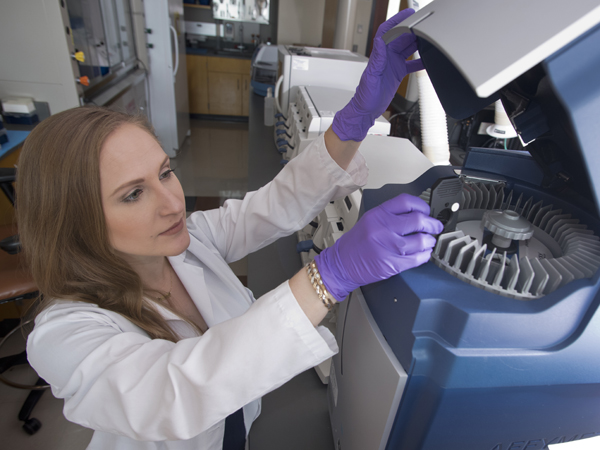
Meredith Cobb, M.D./Ph.D. student, prepares specimen slides during her summer research rotation.
Unlike traditional medical students, M.D./Ph.D. students complete required laboratory rotations during the pre-M1 and M2 summers. This allows them to identify a department and faculty mentor and even get a jumpstart on their dissertation research before starting the Ph.D. component.
Cobb started even earlier as part of the Summer Undergraduate Research Experience (SURE) Program. She worked with Dr. Damian Romero, associate professor of biochemistry. She also shadowed physicians from pediatric genetics and obstetrics that same summer.
“My interests spiraled from there. I realized that I wanted to do both,” and be a physician-scientist, Cobb said.
When Cobb was 8 years old, she read a microbiology textbook with the intent of figuring out how to cure her grandmother's cancer. These days, Cobb is finishing rotations in the biochemistry and pharmacology departments and wants to study genetics.
“I loved learning about Punnett squares and Mendel's experiments in school,” she said, “and I think genetics is pertinent to the future of medicine.”
Cobb said UMMC was the natural choice for her education.
“UMMC already felt like home.”
Ezekiel Gonzalez-Fernandez, M2, Class of 2022
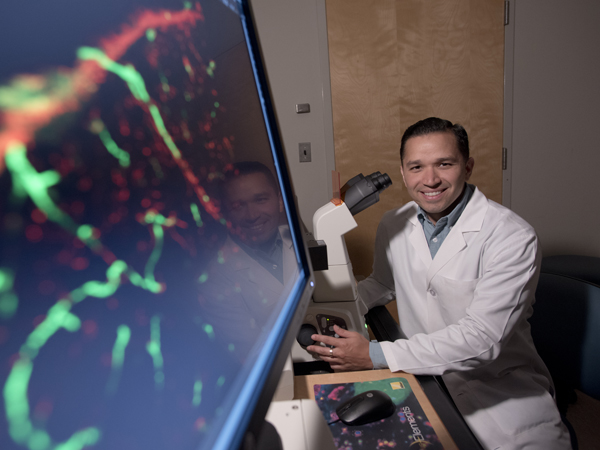
Ezekiel Gonzalez-Fernandez, an M2, conducts hypertension research during the summer.
Transitioning from bankruptcy law to medical school sounds like jumping out of the frying pan and into the fire, but Gonzalez-Fernandez is glad he made it back to his “first love.”
Both his father and grandfather are M.D./Ph.Ds. As a child he worked in their labs, shadowed them in the hospital and witnessed the synergy between research and clinical medicine.
Gonzalez was also interested in business. Before coming to UMMC, he spent five years managing a sales team at the nation's largest bankruptcy firm.
“I decided that I wanted to help people in a more intimate way,” Gonzalez said. So he went back to school, earned a chemistry degree at California State University-Long Beach and prepared for his new career.
Gonzalez researches the link between hypertension and dementia with Dr. Richard Roman, professor of pharmacology. He would like to pair this research with a future career in cardiology.
The M1 class schedule was a grueling experience Gonzalez said. He, Cobb and their M.D. classmates spent Mondays through Fridays, 8 a.m. to 5 p.m., in gross anatomy, histology, biochemistry, physiology and population health. “Then you take the work home with you,” he said.
“You go from studying four or five hours a day in undergrad to studying almost every hour that you're awake.”
Despite the schedule, he is genuinely happy to be at UMMC.
“My classmates are unbelievable. They are helpful and generous and there's such a camaraderie in the class,” he said. “UMMC gave me the opportunity to fulfill my dream.”
Hannah Rice, M3, Class of 2021
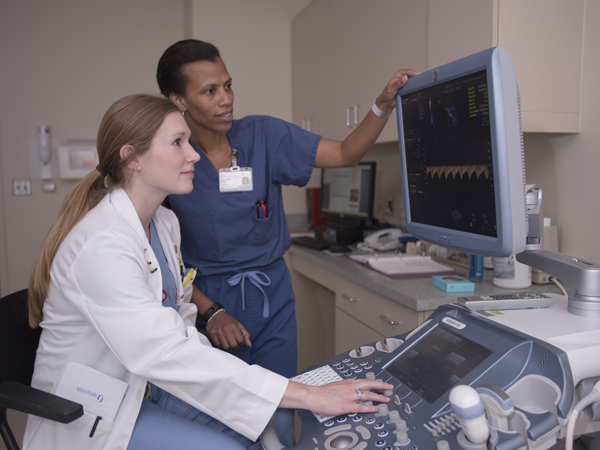
Hannah Rice, left, an M3, studies an ultrasound with Dr. Michelle Owens, associate professor of obstetrics and gynecology
Rice describes herself as a hands-on person, which will serve to her advantage during clerkship.
In June, Rice started doing clinical rotations througho University Hospitals, learning about the ins and outs of internal medicine, pediatrics, neurology and other electives.
She is interested in emergency medicine as a clinical specialty because of its constant nature.
“I love diving into problems, especially ones that nobody else has solved before,” she said.
When Rice isn't studying, she keeps her brain and hands occupied with creative activities such as sewing, painting and playing the piano.
“It lets your mind think differently. I love creating something where there wasn't something before,” she said.
For her dissertation research, Rice intends to join the lab of Dr. Jennifer Sasser, assistant professor of pharmacology and toxicology, and work on preeclampsia research.
Rice studied marine biology at the University of Southern Mississippi, then realized she wanted a career with bot research and a people-oriented focus. She switched her major to medical laboratory science because it “married clinical and basic research,” she said.
Rice calls the M.D./Ph.D. experience life changing, in part due to the support she and other students have received from their professors.
“The faculty at UMMC are interested in helping students succeed,” she said.
Ashley Newsome, G2, class of 2019
Newsome's research could answer big questions for Mississippi's littlest patients.
“My laboratory studies the effects of low birth weight (less than 5.5 pounds) on long-term health,” said Newsome, who is pursuing a Ph.D. in physiology and biophysics. “These individuals have an increased risk for heart and kidney disease, high blood pressure, obesity, type 2 diabetes.”
Newsome studies the mechanisms that connect low birth weight to kidney disease and the reason for differences in disease onset between low birth weight males and females.
“This is important because understanding why this risk factor has detrimental effects on health can lead to earlier interventions that reduce the burden of disease for many patients,” Newsome said.
This research also ties in with her clinical interests. “I fell in love with obstetrics and gynecology because of its unique combination of primary and surgical care and its emphasis on women's health,” she said.
Newsome, who participated in the Rural Medical Scholars Program at Mississippi State University, has wanted to be a doctor since childhood. However, her parents and professors encouraged her decision to pursue a dual degree.
“I wanted both the personal impact of seeing patients and the long-term impact of contributing to understanding health and disease,” she said.
For people considering an M.D./Ph.D - or any other career path - Newsome has some advice.
“Figure out what is a good fit for you, what fills you with wonder and thankfulness that you get to do it every day, and run after that.”
David Sandlin, G3, Class of 2018
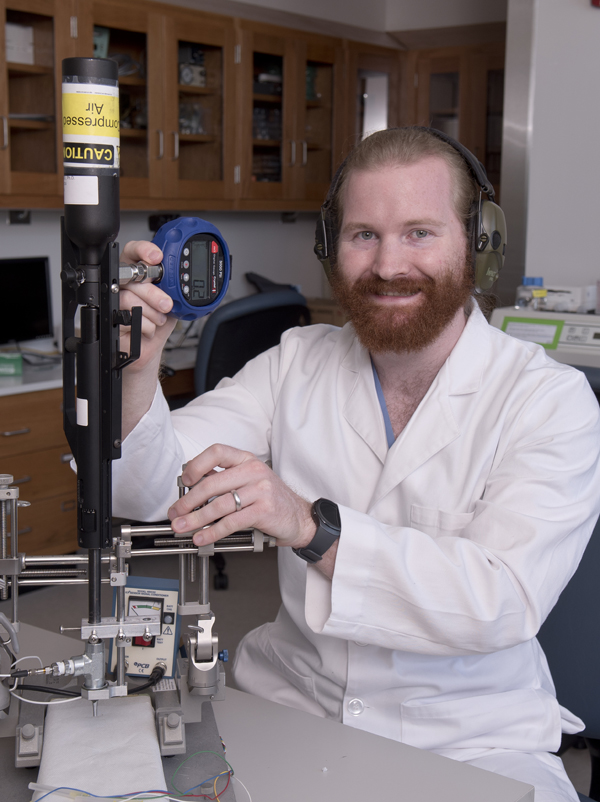
David Sandlin, G3, and his experimental blast machine.
How do you conduct an experiment if you don't have the proper equipment? The former motorcycle mechanic-turned-neuroscience major used his tinkering abilities to build his own.
Sandlin designed a device that delivers a highly focused blast injury to study how the ear canal may serve as a conduit for blast-induced neurotrauma.
“The model is analogous to a soldier in a Humvee and the trauma that soldier may experience after an IED explosion,” Sandlin said.
During clerkship rotations, Sandlin worked with patients who may someday benefit the most from his research: veterans at the G.V. “Sonny” Montgomery V.A. Medical Center.
Sandlin, who is considering residency options in neurology or otolaryngology, chose to enroll in the M.D./Ph.D. program because of the two professional opportunities.
“You can't treat patients with just a Ph.D. and you get more opportunities for research with both degrees,” he said.
With five years of the seven now complete, Sandlin said he is open to meeting with interested undergraduates to tell them about the M.D./Ph.D. lifestyle.
“Figure out what you want to do,” he tells them. “Spend time in the lab and get some exposure to both research and medicine before applying to programs.”
Sandlin is positive his hard work will be worth it after completing the degrees and a residency, potentially out-of-state. After that, he plans to return to his home state.
“It would be wise to come back. I do love Mississippi.”
Bernadette DeRussy, M4, Class of 2017
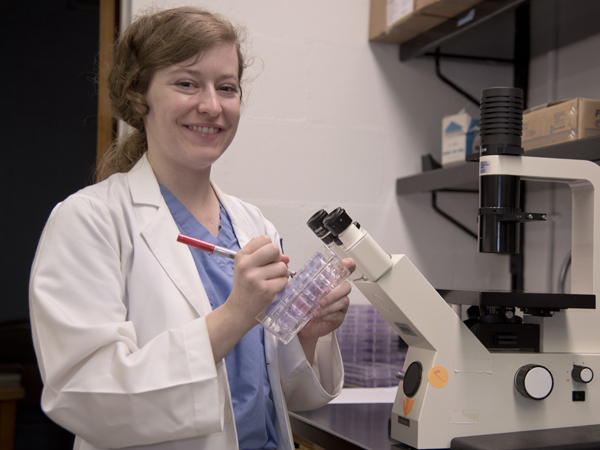
Bernadette DeRussy works in the UMMC pathology labs
Reading Richard Preston's “The Hot Zone” and working with West Nile Virus in a biosafety level 3 laboratory helped solidify DeRussy's path into research and infectious disease.
“I realized that I really do like microbiology,” DeRussy said.
However, she didn't consider an M.D./Ph.D. until her biology honors thesis advisor at Millsaps College recommended it.
“I had no idea that an M.D./Ph.D. was an option,” she said.
This spring, DeRussy defended her dissertation on the function of two proteins in cytomegalovirus. This common herpes-type virus is benign in most humans, but can cause disease in immunocompromised individuals, such as those with HIV.
For students considering an M.D./Ph.D., DeRussy's recommendation is to do as much research as possible before entering a program. That advice has served her well: DeRussy is one of UMMC's top student researchers, winning the Robert A. Mahaffey Award for exceptional research potential of young investigators at this year's SGSHS Honors Day.
On the clinical side, DeRussy will pursue pathology during
her residency, a specialty that runs in her family. To keep her skills honed during the Ph.D. years, she regularly met with
Dr. William Daley, professor of pathology, to review pathology cases.
“It keeps me excited about clinical work and moving
towards residency,” she said.
Dr. Peter Mittwede, Class of 2016
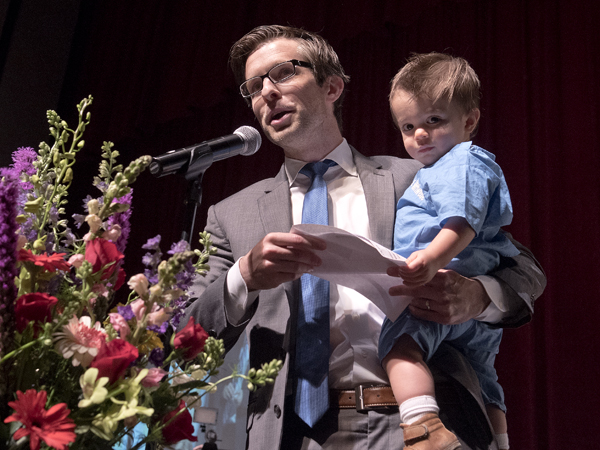
Dr. Peter Mittwede hold his son Isaac as he reads his match during the 2016 Match Day ceremony.
On March 26, Mittwede stepped up onto the stage at Thalia Mara Hall with his son Isaac in his arms and told the audience he was Pennsylvania-bound.
Mittwede, now an orthopaedic surgery resident at the University of Pittsburgh Medical Center, participated in Match Day 2016 like his fellow medical students. But unlike those students, he earned another degree along the way.
Mittwede said that his parent's selfless nature helped inspire him to be a doctor.
“They set such a good example of putting others first,” he said, remembering how they served people as missionaries in Turkey.
Along with a love of soccer, his desire to help others led him to shadow sports doctors and physical therapists during college. Mittwede finished his physiology Ph.D. in 2015, writing his dissertation on systemic effects of orthopaedic trauma in lean and obese rats.
The M.D./Ph.D. dual degrees have a complementary effect on each other, Mittwede said.
“Clinical training helps you form good research questions and research experience will help me be a better
doctor.”
Dr. Kim Gannon, Class of 2011
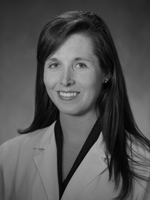
Cannon
Now a vascular neurologist for Christiana Health Care System in Wilmington, Del., Gannon completed residency and a fellowship at the Hospital of the University of Pennsylvania.
“My path has been a winding one,” Gannon said, “starting in basic science and evolving into clinical research, and recently evolving into quality improvement research.”
This breadth of experience allowed Gannon to work in both clinical care and research, including research she conducted with an NIH R25 grant that built upon her UMMC experience.
“This research branched off of my work in (associate professor of physiology and biophysics) Dr. Heather Drummond's lab looking at vasoconstriction with alterations in blood flow, but this time in the human population rather than mice.”
Drummond and other physiology faculty encouraged Gannon to pursue the dual degree back when she was a UMMC lab technician after graduating from Millsaps College. Although Gannon enjoys basic research, she said she felt called to medicine.
Gannon's clinical mentors, former neurology professors Dr. S.H. Subramony and Dr. James Corbett “provided a launching pad for my career” and “showed me how to be a leader,” she said.
“Training in basic science and clinical medicine have given me the skills to problem-solve and handle challenging situations,” Gannon said. The M.D./Ph.D. still gives students those skills.
“UMMC prepares you to go anywhere you want.”


